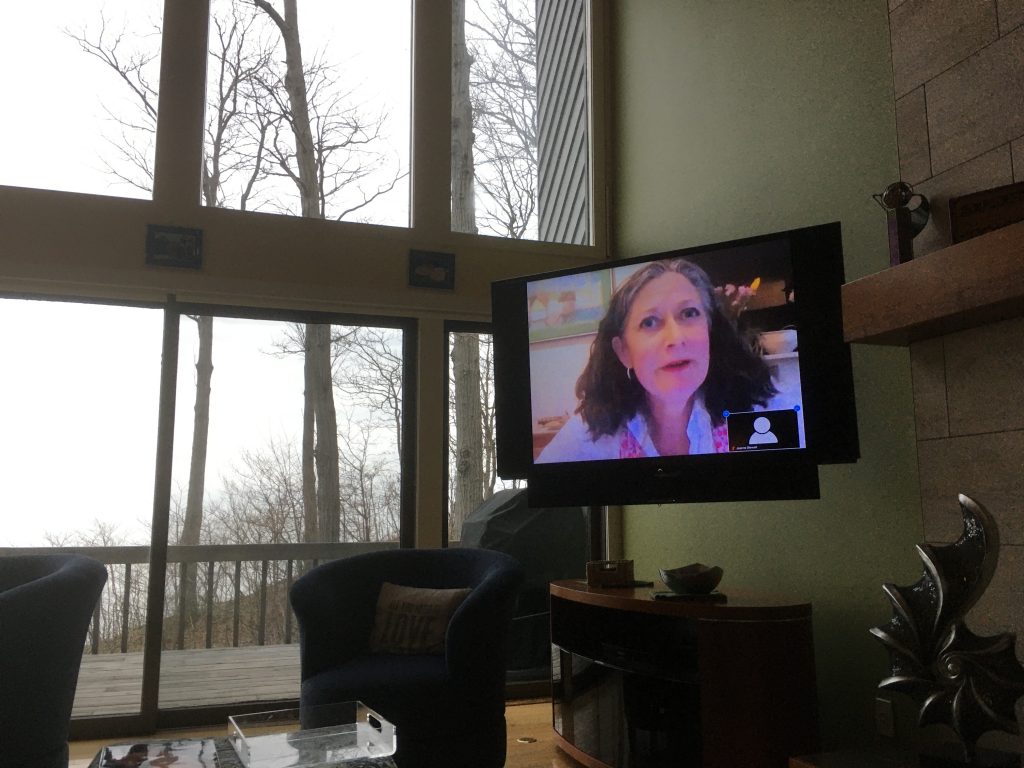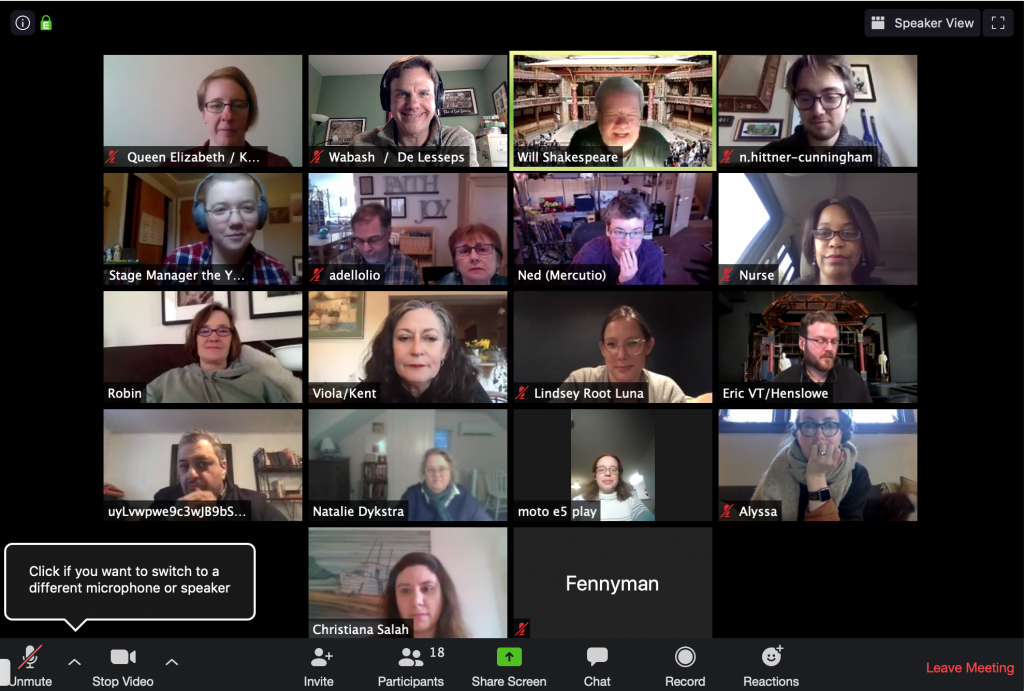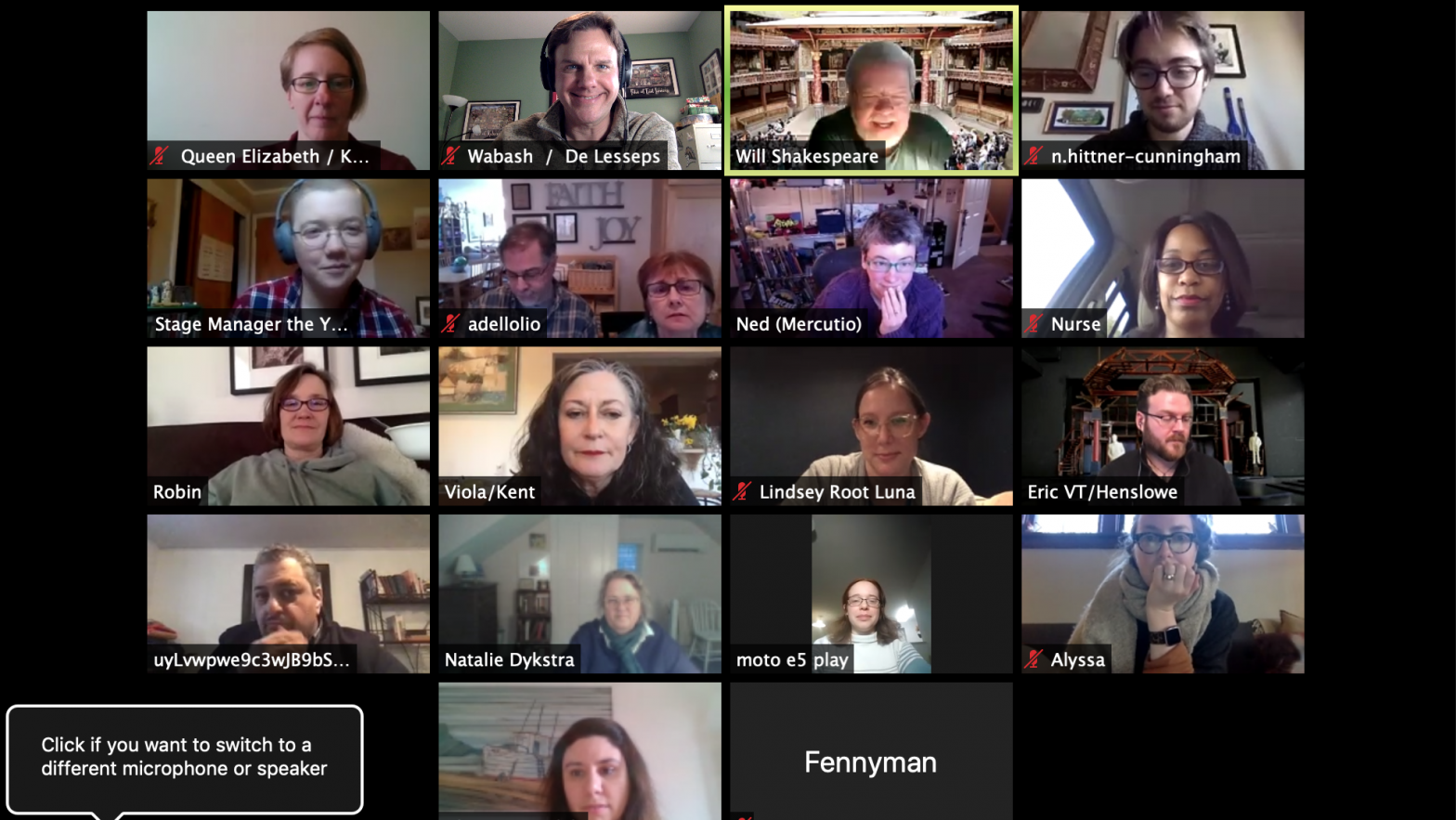They have no props, or costumes, or scenery. But that’s a not a problem and that’s not the point. What they do have is all that they need: a play script, a Zoom room, and a gladness for a connection with friends in the Hope community.
Every Monday night for the past three weeks, approximately 30 members of the Hope faculty have pulled up a chair in front of their home computers, opened the script of “Our Town” or “Shakespeare in Love” or “Borrowed Babies,” activated their creative juices, and collectively read aloud each play’s narrative while in character.
The idea for such a collaboration in this time of social distancing came from Michelle Bombe, professor of theatre and chairperson of the department.
“With theatre, when we are at our best, we give people ideas to think about and concepts to consider, but we also give them a little window into another world as a form of escape that people need, that people crave.”
“When Covid-19 first started, I thought, does what I do matter? I wish I were a nurse. I wish I were doing something that was really of help,” she said. “At some point, I thought, ‘No, I do have something.’ Theatre can make a difference and satisfies my need to be of service in some way during this time.”
And as most things do in academia, it started with students in mind.
“Our (theatre) students are accustomed to having rehearsal every night,” Bombe says. “And they are lost at sea right now with not having a creative project, but also not having that creative community. It’s part of what we do in theatre: create this sense of community by working on a piece of art together.”

So, since the spring production of “Twelfth Night” was cancelled (postponed actually as it will be the opening production in the fall), every Wednesday since late March, Bombe and her students have met to conduct play readings. It’s been a release . . . and a revelation because she then thought, why not do the same with her colleagues from across the Hope faculty? Perhaps they are in need, and want, of a community to help them connect, process and rethink their time physically away from each other, too?
“With theatre, when we are at our best, we give people ideas to think about and concepts to consider, but we also give them a little window into another world as a form of escape that people need, that people crave,” explains Bombe.
“But it’s also about the community around that escape. That’s what the faculty have appreciated. Just the fact that they’re getting to see everybody’s faces in a different way. I mean, it’s one thing to see each other in a committee or department meeting on Zoom – and the faculty have been great in those meetings to interject humor and not have it just be about business. But it’s not the same thing as having a social time together. And that’s what these play readings are doing for us.”
Dr. Jayson Dibble, associate professor of communication, concurs. As relational communications specialist, he was drawn to the Monday night readings for their connections that “transcend video screens and WiFi airwaves. Humans are social creatures,” he says. “We find ways to connect even when we don’t have available our preferred channels.”

His other rationale for taking a role in “Shakespeare in Love”: He probably would have been watching a two-plus-hours movie anyway. “So rather than watch a recording of drama,” he explains, “I could witness that drama unfold live. And all this while getting a glimpse of my beloved Hope colleagues.”
Bombe chose “Our Town” for its meaning, “Shakespeare in Love” for its fun, and “Borrowed Babies” for its message. “Our Town” in particular was a crucial choice as the first play in the lineup. Launching the project from good footing was a priority, and she found some of that strong base when President Matthew A. Scogin agreed to read the part of the Stage Manager, a role that serves as a leader and spokesperson in the play to familiarize the audience with various aspects of the town of Grover’s Corners.
“I have been so thankful to have Matt Scogin as our president as we go through this time,” she says, “because as a leader, he’s giving us direction and comfort with all kinds of things we need to hear as encouragement.”
“I also thought, we need something that’s going to help us think about what we have, not what we lost,” Bombe explains. “That’s what I think ‘Our Town’ is about. It helps us stop for a second and really look at our lives. And that’s the gift, I think, that is coming out of this pause in our time of hurry, hurry. Now we are forced to slow down.
“But I also feel incredibly guilty because I’m comfortable in my home,” she continues. “I have food and I have everything I need. And so many people don’t. So, I know it’s a double-edged sword here. But the gift that’s part of this is the fact that we’re all going to look at what we have and be so thankful. That’s what ‘Our Town’ means for me. It’s not the special things. It’s not the highlights. It’s the everyday part of life that matters.”
“I am very sad about the cancelled Hope Summer Repertory Theatre season, and this alleviates some of that sadness,” Joanne Stewart says.
Some colleagues like Dr. Joanne Stewart, professor of chemistry, just drop in to listen and watch. Like Dibble, she is gladdened by the community the readings provide as well as for their provision for another purpose. “I am very sad about the cancelled Hope Summer Repertory Theatre season, and this alleviates some of that sadness,” Stewart says.
Dibble has other takeaways, too, such as fond memories of “getting to see more of some folks’ sense of play and lightheartedness. Realizing that even if we’re physically separated, we can still create together. And we can still laugh together.”
Oh, and this one last thing: “If you haven’t heard Sonja Trent-Brown’s cockney-accented nurse (for ‘Shakespeare in Love’), then you’re not living at all!”


